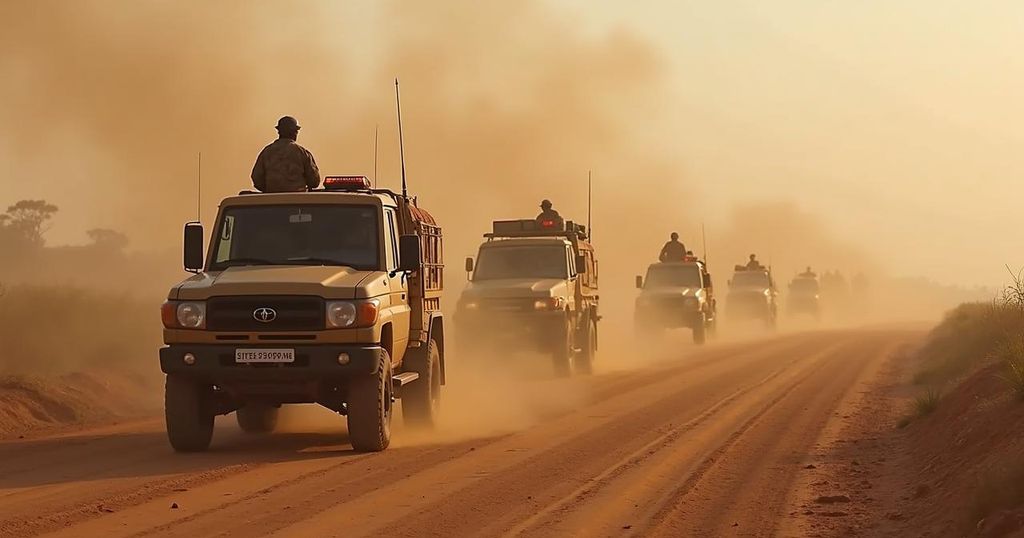Foreign Arms Shipments and the Sudanese Civil War: A Growing Crisis
Sudan’s civil war, ignited by rising tensions between the military and Rapid Support Forces since April 2023, is being intensified by clandestine arms shipments from the UAE and Iran. Evidence from various sources points to foreign support for both sides in the conflict, amid widespread humanitarian crises and failed peace efforts. The strategic significance of Sudan further complicates international interests in the region, suggesting potential for broader instability.
A recent analysis has uncovered that the ongoing civil war in Sudan is significantly exacerbated by clandestine arms transfers from foreign nations, notably the United Arab Emirates (UAE) and Iran. This observation is grounded in confidential assessments, a report funded by the U.S. State Department, and evidence from captured military equipment. Both the Rapid Support Forces (RSF) and the Sudanese military have reportedly received arms support from international players, despite official denials from the governments involved. The Sudan Conflict Observatory, a U.S.-funded group, has documented 32 flights from the UAE to the RSF between June 2023 and May 2024, suggesting these were weapons transfers. In contrast, the UAE has publicly refuted these claims, with its Ministry of Foreign Affairs asserting, “The UAE is not providing any support or supplies to the Rapid Support Forces (RSF) or any other warring parties.” Simultaneously, the Sudanese military has utilized foreign-provided drones, particularly those of Iranian origin. Reports indicate that flights from Iran to Sudan have delivered military equipment, illustrating a complex web of foreign involvement in the conflict. While Sudanese officials have denied receiving Iranian drones, some security sources confirmed these allegations, although Iranian officials have not provided commentary on the matter. Sudan has seen a massive displacement of its population since the outbreak of the civil war in April 2023, alongside looming famine prospects. Diplomatic efforts led by the U.S. to achieve peace have encountered significant obstacles, and regional players are increasingly involved, raising fears of a broader instability. U.S. Special Envoy to Sudan, Tom Perriello, emphasized the ramifications of a potential failed state in Sudan, noting that regional stability is at stake. The UAE’s interests in Sudan stem primarily from concerns over the Red Sea shipping lanes and potential threats from Islamist factions, as well as substantial investments in gold and agriculture sectors within Sudan. Further complicating the military dynamics, Sudan’s military has begun to seek assistance from Iran and Russia following reduced support from traditional allies. In an environment where arms are flowing and foreign intentions are convoluted, the possibility of a vast regional crisis looms, with vast implications not just for Sudan, but for neighboring countries as well. The situation remains fluid, with military flights from both UAE and Iran continuing, signaling that foreign involvement in Sudan’s civil strife is a critical aspect that may influence the trajectory of the conflict.
The ongoing civil war in Sudan, which escalated in April 2023, has roots in the increasing tensions between the military and the Rapid Support Forces (RSF). With both sides having previously shared governing authority, the conflict has led to extensive violence and humanitarian crises, including mass displacement and threats of famine. As documented by the Sudan Conflict Observatory, foreign countries, particularly the UAE and Iran, have been implicated in supplying arms and support to these factions. This foreign influence complicates peace efforts by the U.S. and other nations, intensifying the geopolitical implications surrounding Sudan’s stability, especially given its strategic location along the Red Sea.
In conclusion, the civil war in Sudan is significantly fueled by covert arms shipments from foreign nations, notably the UAE and Iran, complicating an already dire humanitarian situation. Despite public denials from involved parties, various reports highlight the reality of these arms transfers, which are contributing to the ongoing violence and instability in the region. With numerous countries pursuing their interests through military support, the potential for escalation and regional destabilization remains a pressing concern.
Original Source: www.washingtonpost.com




Post Comment